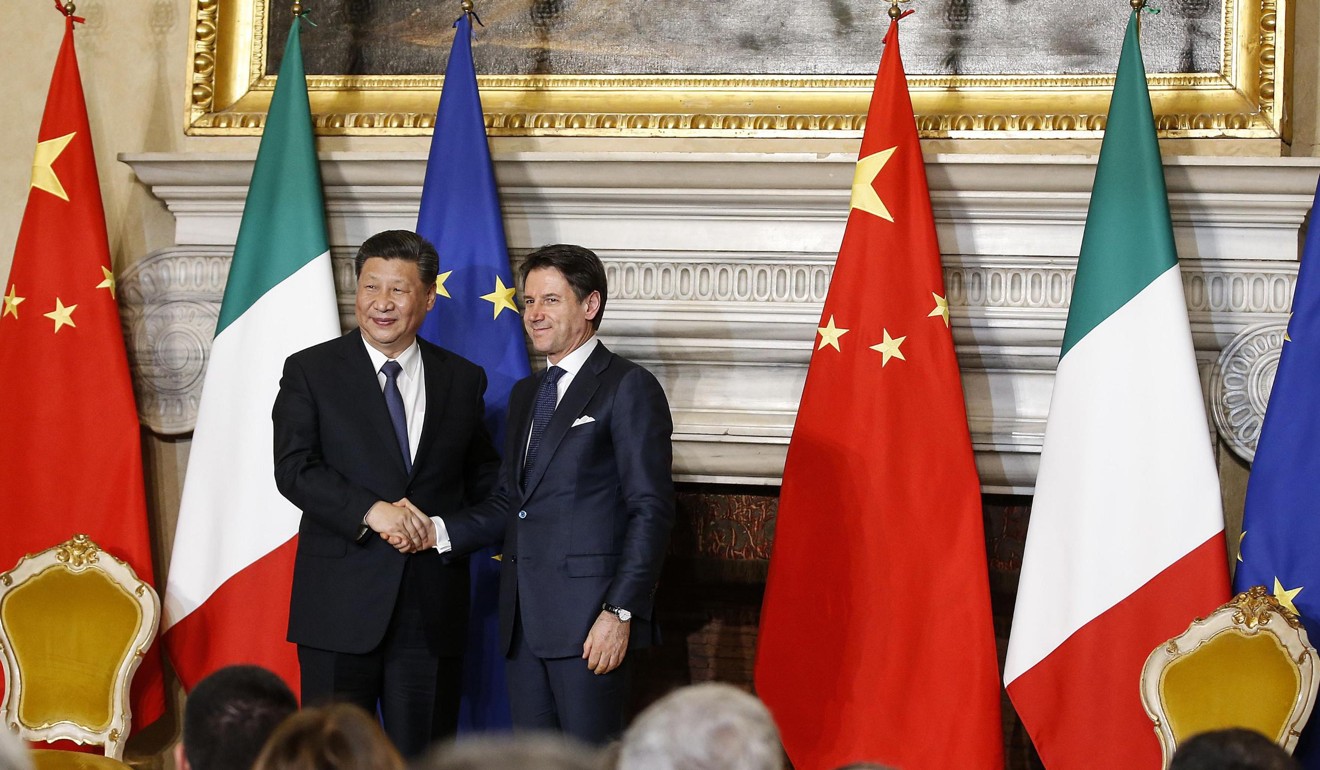
Smaller European states give EU greater say over China deals to ease concerns over Beijing’s influence
- Brussels consulted over draft belt and road deals to be signed at a summit between China and Central and Eastern European nations
- Move is an attempt to address growing concerns that Beijing will undermine the EU’s cohesion
Central and Eastern European countries are allowing Brussels more influence over their trade and infrastructure deals with China in an attempt to allay the EU’s growing concerns about Beijing’s influence.
The decision to allow EU officials to see draft deals to be signed at the upcoming “16+1” summit – which involves both EU and non-EU members from the former Eastern bloc – comes amid a growing attempt to ensure a more cohesive EU approach towards China.
The bloc recently described China as a systemic rival for the first time and expressed concern about member states joining for the “Belt and Road Initiative” – a move it sees as an attempt to sign up partners who will be less critical of Beijing.
The suspicions intensified after Italy signed a memorandum of understanding to join the transcontinental infrastructure project, and the 16+1 summit which starts in the Croatian port of Dubrovnik on Friday – where the belt and road plan will be a key item on the agenda – may only fuel those concerns.
Italy becomes first G7 nation to sign up for China’s belt and road plan
Diplomatic sources said both China and the 16 nations were trying to ease EU worries by being more transparent about the deals signed.
“This year the process could not be more transparent for Brussels,” said a diplomatic source familiar with the matter.
“In this year’s negotiations on the 16+1 joint statement, there was a high level of coordination between Brussels and its EU member states, and each completed draft was seen by EU officials in Brussels”.
Greece says EU’s China concerns must not harm its economic interests
China has also agreed to reverse the order of two annual European summits.
This year a summit between China and the EU will be held before the 16+1 gathering after the decision to hold the latter first 12 months ago was seen in Brussels as sign that Beijing regarded the EU as a secondary concern.
Diplomatic observers said China was more anxious to dispel EU worries this year as it seeks the bloc’s support for the belt and road plan, and efforts to promote free trade and multilateralism as the US swings towards isolationism.

In recent weeks Brussels has labelled China as a “systemic rival” in a policy paper listing a 10-point action plan for a more balanced and reciprocal economic relationship with China.
Greece’s ancient civilisation was once a lure for China’s leaders. Now it could prove their nemesis
There has also been a growing push for a united front when dealing with Beijing – as symbolised by French President Emmanuel Macron’s decision to invite the European Commission president and German Chancellor to meet Chinese leader Xi Jinping on his state visit to France.
But the bloc’s calls for a collective response to a surge of Chinese takeovers in critical sectors has been hampered by divisions within its member states. Italy, for example, has complained that opposition to its joining the belt and road scheme was motivated by “jealousy”.
“The overall relationship between China and Europe has been affected as China is pushing for some EU states to join the belt and road plan,” said Pang Zhongying, a professor of international relations at Ocean University of China. “The plan has had an impact on China’s EU policy and a relationship that has taken years to build up”.

Sending the draft documents to EU should help the bloc to come up with a strategy to prevent it from being “divided and conquered”, Pang said.
“It is necessary for China to have sincere consultation with EU on the Belt and Road Initiative. Taking advantage of the differences among EU member states may lead to more loss than gain,” he said.
The uncertainty surrounding the policy had also triggered suspicion over whether the EU should cooperate with China in other areas, Pang said.
EU leaders hold out olive branch to China, saying they want active role in belt and road plan
In recent months, Chinese officials have repeatedly said Beijing has no intention to divide Europe, stressing that a unified EU is in China’s interests.
They also said China welcomed the involvement of major EU nations in the 16+1 gathering.

Ding Chun, a professor of European Studies at Fudan University in Shanghai, said China had become more aware of the EU’s frustration as the bloc had become more outspoken.
“China wants to send more positive signals to ease the concerns of nations such as France and Germany,” he said.
“The need to protect multilateralism, globalisation and free trade override the differences between China and the EU.”
China would also ask its enterprises to pay closer attention to EU regulations and laws when launching belt and road projects in the continent, Ding said.


